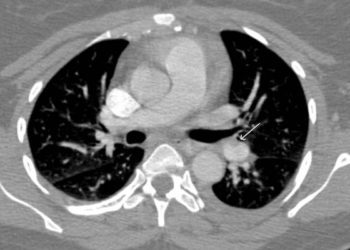Thrice weekly iron supplementation non-inferior to thrice-daily treatment for iron-deficiency anemia
1. This noninferiority trial found that at 12 weeks, hematologic responses to 200 mg ferrous fumarate thrice weekly (TIW) were not significantly different than the TID iron treatment group for iron deficiency anemia (IDA) by week 12 of treatment.
Evidence Rating Level: 1 (Excellent)
IDA is a relatively common condition affecting patients’ quality of life. If non-inferior, a TIW treatment regimen would be more cost-effective, reduce pill burdens, and could potentially lend to a lower incidence of adverse events associated with ferrous fumarate use (e.g., metallic taste, epigastric discomfort, constipation, nausea). Therefore, this noninferiority trial sought to evaluate the effectiveness of lower dose regimens on IDA. A total of 64 patients were randomized either to the TID (n = 32) or TIW arms (n = 32) at enrollment, and by week 12, there remained 27 and 26 participants in each arm, respectively. At week 4, the hemoglobin (Hb) level in the TID arm was significantly higher than the TIW arm (9.9 vs. 10.8 g/dL, respectively, p = 0.040), but by week 12, there was no longer a significant difference between either arm (11.9 vs. 12.4 g/dL, p = 0.188). While the TID group may have seen a faster result, the difference was short-lasting. The primary endpoint of an increase in Hb of ≥ 3 g/dL was achieved by both groups without a significant difference (p > 0.05). In terms of secondary outcomes, although the mean Hb in the TID group (12.4 g/dL) was higher than in the TIW group (11.9 g/dL) by week 12, the mean Hb was not significantly different between the groups (< 0.9 g/dL). All participants from both arms recovered from anemic symptoms (fatigue, dyspnea on exertion, dizziness, sore tongue, taste disturbance, and pica) by week 12 as well. From a hematological standpoint, the transferrin saturations and serum ferritin levels between both groups were no different by week 12 (64.3% vs. 73.1%, p = 0.430). Compliance by week 12 was 95.4% in the TIW arm, and 92.0% in the TID arms. There was a relatively high attrition rate (17%) with only 64 participants to begin with, which may be interpreted as a potential limitation of this study. However, results are promising and should be further elucidated as the potential for less frequent dosing with ferrous fumarate may provide a cost-effective solution that decreases the frequency of common adverse effects associated with the supplement.
Click to read the study in Annals of Hematology
Image: PD
©2023 2 Minute Medicine, Inc. All rights reserved. No works may be reproduced without expressed written consent from 2 Minute Medicine, Inc. Inquire about licensing here. No article should be construed as medical advice and is not intended as such by the authors or by 2 Minute Medicine, Inc.







